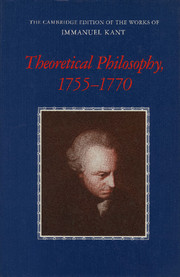Book contents
- Frontmatter
- Contents
- General editors' preface
- Preface
- Guide to abbreviations
- General introduction
- Introductions to the translations
- Résumés of the works
- A NEW ELUCIDATION OF THE FIRST PRINCIPLES OF METAPHYSICAL COGNITION (1755)
- THE EMPLOYMENT IN NATURAL PHILOSOPHY OF METAPHYSICS COMBINED WITH GEOMETRY, OF WHICH SAMPLE I CONTAINS THE PHYSICAL MONADOLOGY (1756)
- AN ATTEMPT AT SOME REFLECTIONS ON OPTIMISM (1759)
- THE FALSE SUBTLETY OF THE FOUR SYLLOGISTIC FIGURES (1762)
- THE ONLY POSSIBLE ARGUMENT IN SUPPORT OF A DEMONSTRATION OF THE EXISTENCE OF GOD (1763)
- ATTEMPT TO INTRODUCE THE CONCEPT OF NEGATIVE MAGNITUDES INTO PHILOSOPHY (1763)
- INQUIRY CONCERNING THE DISTINCTNESS OF THE PRINCIPLES OF NATURAL THEOLOGY AND MORALITY (1764)
- Introduction
- First reflection General comparison of the manner in which certainty is attained in mathematical cognition with the manner in which certainty is attained in philosophical cognition
- Second reflection The only method for attaining the highest possible degree of certainty in metaphysics
- Third reflection On the nature of metaphysical certainty
- Fourth reflection Concerning the distinctness and certainty of which the fundamental principles of natural theology and morality are capable
- Appendix Abridgement of Moses Mendelssohn's prize-winning essay
- M. IMMANUEL KANT'S ANNOUNCEMENT OF THE PROGRAMME OF HIS LECTURES FOR THE WINTER SEMESTER 1765 — 1766 (1765)
- DREAMS OF A SPIRIT-SEER ELUCIDATED BY DREAMS OF METAPHYSICS (1766)
- CONCERNING THE ULTIMATE GROUND OF THE DIFFERENTIATION OF DIRECTIONS IN SPACE (1768)
- ON THE FORM AND PRINCIPLES OF THE SENSIBLE AND THE INTELLIGIBLE WORLD [INAUGURAL DISSERTATION] (1770)
- Factual notes
- Bibliographies of editions and translations
- Glossary
- Biographical-bibliographical sketches of persons mentioned by Kant
- Index
Appendix - Abridgement of Moses Mendelssohn's prize-winning essay
Published online by Cambridge University Press: 18 December 2014
- Frontmatter
- Contents
- General editors' preface
- Preface
- Guide to abbreviations
- General introduction
- Introductions to the translations
- Résumés of the works
- A NEW ELUCIDATION OF THE FIRST PRINCIPLES OF METAPHYSICAL COGNITION (1755)
- THE EMPLOYMENT IN NATURAL PHILOSOPHY OF METAPHYSICS COMBINED WITH GEOMETRY, OF WHICH SAMPLE I CONTAINS THE PHYSICAL MONADOLOGY (1756)
- AN ATTEMPT AT SOME REFLECTIONS ON OPTIMISM (1759)
- THE FALSE SUBTLETY OF THE FOUR SYLLOGISTIC FIGURES (1762)
- THE ONLY POSSIBLE ARGUMENT IN SUPPORT OF A DEMONSTRATION OF THE EXISTENCE OF GOD (1763)
- ATTEMPT TO INTRODUCE THE CONCEPT OF NEGATIVE MAGNITUDES INTO PHILOSOPHY (1763)
- INQUIRY CONCERNING THE DISTINCTNESS OF THE PRINCIPLES OF NATURAL THEOLOGY AND MORALITY (1764)
- Introduction
- First reflection General comparison of the manner in which certainty is attained in mathematical cognition with the manner in which certainty is attained in philosophical cognition
- Second reflection The only method for attaining the highest possible degree of certainty in metaphysics
- Third reflection On the nature of metaphysical certainty
- Fourth reflection Concerning the distinctness and certainty of which the fundamental principles of natural theology and morality are capable
- Appendix Abridgement of Moses Mendelssohn's prize-winning essay
- M. IMMANUEL KANT'S ANNOUNCEMENT OF THE PROGRAMME OF HIS LECTURES FOR THE WINTER SEMESTER 1765 — 1766 (1765)
- DREAMS OF A SPIRIT-SEER ELUCIDATED BY DREAMS OF METAPHYSICS (1766)
- CONCERNING THE ULTIMATE GROUND OF THE DIFFERENTIATION OF DIRECTIONS IN SPACE (1768)
- ON THE FORM AND PRINCIPLES OF THE SENSIBLE AND THE INTELLIGIBLE WORLD [INAUGURAL DISSERTATION] (1770)
- Factual notes
- Bibliographies of editions and translations
- Glossary
- Biographical-bibliographical sketches of persons mentioned by Kant
- Index
Summary
[Mendelssohn's prize-winning essay was originally published under the title Über the Evidenz in den metaphysischen Wissenschaften in the collection published by the Prussian Royal Academy of Sciences in Berlin in 1764 under the title Dissertation qui a remporté le prix proposé par l'Académie des sciences et belles-lettres de prusse sur la nature, les espèces et les degrés de l'évidence. Avec les pièces qui ont concouru. The official abridgement composed in French (the official language of the Academy) is also to be found in the same collection. The present translation is based on the French text of the abridgement found in Fichant (1973), pp. 105-17, which is, in turn, based on Moses Mendelssohn: Schriften zur Philosophie, Aesthetik und Apologetik (edited by Moritz Brasch), Vol. I, pp. 45 ff.]
The abstract which I am going to read has been drawn up in order to give an idea of this dissertation of those of our colleagues who are unable to read it in the original German. The abstract will display the author's arguments and the chief characteristics of his work, drawn up with all the exactitude of which I am capable.
INTRODUCTION
If we compare the fate of literature and the fine arts with that of philosophy, we shall see, on the one hand, lasting monuments which the passage of time cannot erode, and, on the other, a perpetual flux of sentiments, a vast ruin of systems destroyed by systems. The ancients have left us immortal writings, architectural remains and pieces of sculpture which we still regard as masterpieces. Our poets, our artists, our orators limit their ambition to copying them, and they have rather failed to match them than surpassed them. The glory of Homer has survived for so many centuries, while that of Aristotle, who was for so long the God of the Schoolmen, has almost been eclipsed. Would it not seem mat the principles of taste are more sure and less subject to change than those of reason?
However, the changes themselves which philosophy has undergone, do honour to the spirit of man; these changes are so many advances towards perfection, so many new regions discovered in the empire of truth.
- Type
- Chapter
- Information
- Theoretical Philosophy, 1755–1770 , pp. 276 - 286Publisher: Cambridge University PressPrint publication year: 1992



